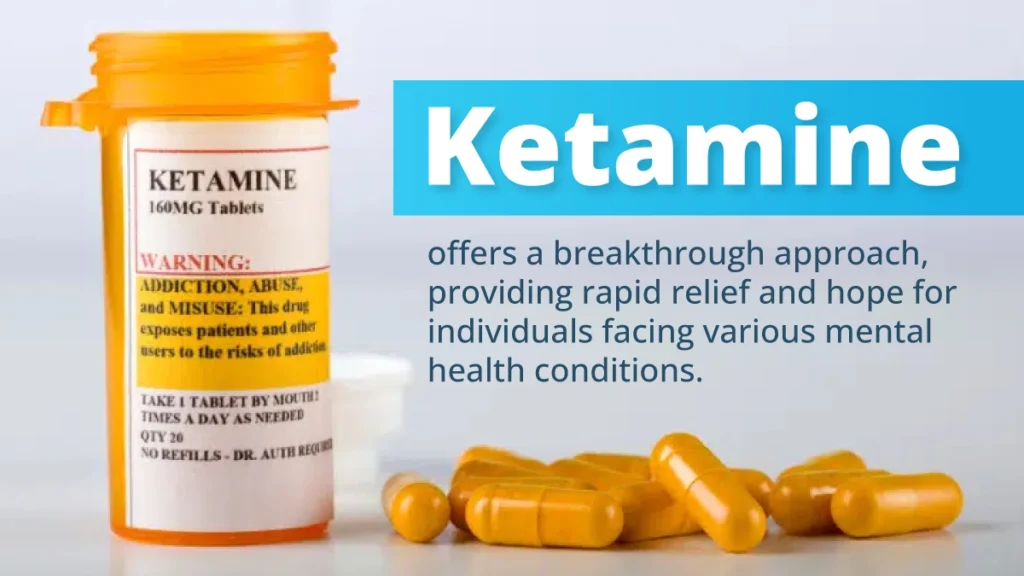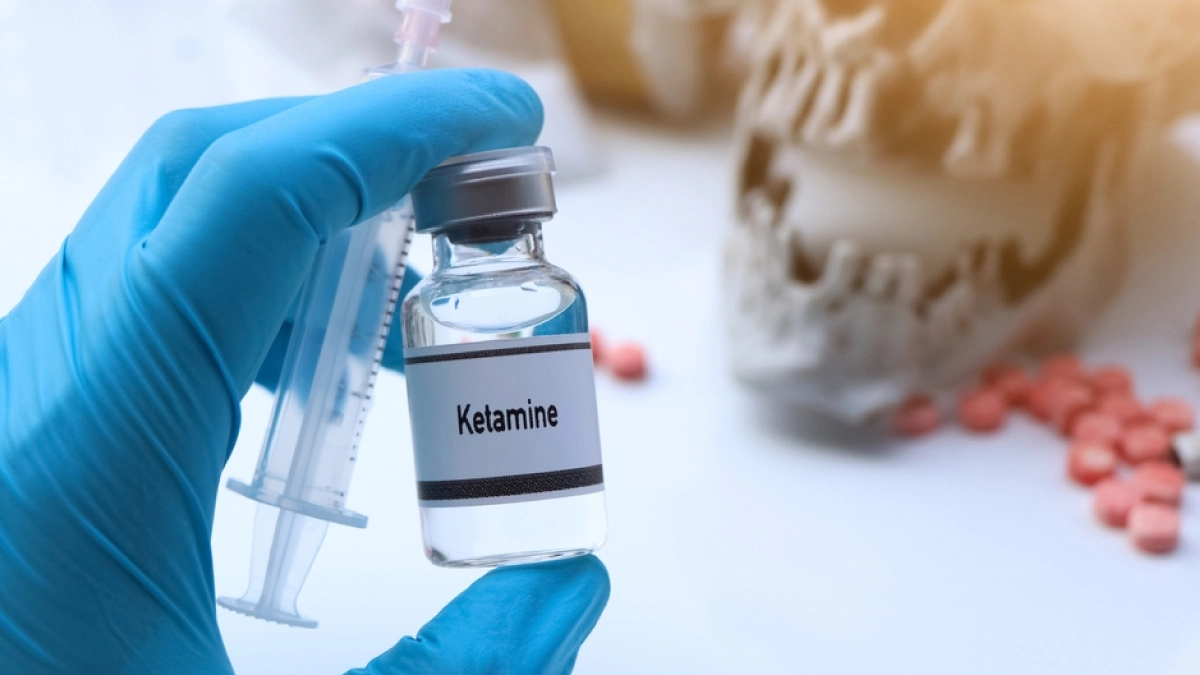Ketamine, initially recognized as an anesthetic, has found promising applications in mental health treatment. In recent years, medical professionals have researched this drug’s potential to address symptoms of various mental health conditions, including major depression.
Key Takeaways
Ketamine, an FDA-approved anesthetic drug, is now a promising mental health treatment. Here is what this article covers:
- Ketamine emerged as a valuable tool in the treatment of psychiatric disorders through a unique mechanism of action.
- Ketamine is administered through various methods, providing flexible and accessible options for mental health care.
- While ketamine therapy is effective in managing various mental disorders, it is not without side effects and risks.
If you’re struggling with mental health problems, seek help at The Haven Detox-Little Rock. Call (501) 271-3342 to learn about treatment options.

Ketamine and Mental Health Treatment
Ketamine, once primarily recognized as a surgical anesthetic, is now making waves in the field of mental health treatment. Here, we explore the key mechanisms through which ketamine influences mental health positively.
Glutamate Modulation
Central to ketamine’s effects is its modulation of glutamate, a key neurotransmitter. By blocking NMDA receptors, ketamine disrupts glutamate transmission, leading to rapid antidepressant effects. This unique action sets ketamine apart from traditional antidepressant medications and offers a new approach for managing treatment-resistant depression.
Synaptic Plasticity
Ketamine promotes synaptic plasticity, facilitating the formation of new neural connections. This property is crucial for learning and memory processes. By enhancing neuroplasticity, ketamine may contribute to cognitive improvements and adaptive responses in individuals grappling with mental health disorders.
Increased BDNF Release
Ketamine stimulates the release of brain-derived neurotrophic factor (BDNF), a protein that promotes neuronal growth and survival. Elevated BDNF levels are associated with improved mood and cognitive function, suggesting that ketamine’s impact on BDNF release contributes to its antidepressant properties.
Anti-inflammatory Effects
Additionally, ketamine exhibits anti-inflammatory effects, influencing the immune system and dampening neuroinflammation. This anti-inflammatory action may be pivotal in alleviating symptoms of mood disorders, as ongoing research and clinical trials highlight the connection between inflammation and mental health.
Ketamine’s Efficacy Across Different Mental Disorders
Ketamine has evolved into a groundbreaking treatment option for a spectrum of mental health conditions. Its success is particularly notable in the treatment of the following disorders:
Major Depressive Disorder (MDD)
Ketamine offers a ray of hope for people grappling with major depressive disorder (MDD). Traditional antidepressant meds may take weeks to show results, but ketamine’s rapid action can provide relief within hours. The modulation of neurotransmitters in the brain contributes to the effectiveness of ketamine in alleviating the debilitating symptoms of MDD.
Bipolar Disorder
In the realm of bipolar disorder, where mood swings between depressive and manic states pose significant challenges, ketamine has shown promise. By stabilizing mood and mitigating the severity of depressive episodes, ketamine infusion therapy emerges as a potential adjunctive treatment for individuals with bipolar disorder.
Post-Traumatic Stress Disorder (PTSD)
For individuals grappling with the haunting aftermath of trauma, ketamine emerges as a potential breakthrough. Post-traumatic stress disorder (PTSD) often involves alterations in neural networks and heightened fear responses. Ketamine’s neuroplasticity-promoting effects may help rewire these maladaptive patterns, offering relief to those with treatment-resistant PTSD.
Obsessive-Compulsive Disorder (OCD)
Ketamine’s role in addressing obsessive-compulsive disorder (OCD) showcases its versatility. Persistent, intrusive thoughts and compulsive behaviors mark OCD. Ketamine’s impact on synaptic plasticity and glutamate modulation may interrupt these cyclical patterns, providing relief to individuals struggling with the often debilitating symptoms of OCD.
How Ketamine Treatment Works
Ketamine is administered through distinct modalities tailored to the patient’s needs and the specific disorder being addressed. Here are the two most common administration methods:
Intravenous Infusion
One of the most common and established methods is intravenous (IV) infusion. This involves a controlled and slow infusion of ketamine directly into the bloodstream.
The IV route allows for precise dosage control and is often preferred for its reliability in achieving the therapeutic effects of ketamine. Clinicians closely monitor patients during the infusion to manage potential side effects and ensure safety.
Intranasal Administration
Intranasal administration is a more recent but increasingly popular method involving the direct delivery of ketamine through the nasal passages. This method is valued for its non-invasive nature and ease of use.
Intranasal administration provides a convenient alternative, especially in outpatient treatment settings, while still offering effective and rapid relief for people undergoing ketamine therapy for mental illnesses.
Phases of Ketamine Treatment
When it comes to the use of ketamine for mental health treatment, the treatment typically involves multiple phases. Here’s the breakdown:
Induction Phase
The induction phase involves the initial sessions of ketamine treatment, where patients typically receive a series of infusions over a short period. During the induction phase, the dosage is usually higher and may be administered intravenously (IV). The exact dosage can vary based on the patient’s needs, medical history, and the treated condition.
Stabilization Phase
After the initial induction phase, patients may enter a stabilization phase. The frequency of ketamine infusion sessions may decrease during this phase. The dosage may be adjusted based on the patient’s response to the initial treatments. Some individuals may require ongoing maintenance infusions, while others may transition to less frequent sessions.
Maintenance Phase
The maintenance phase involves longer-term and less frequent ketamine treatments to sustain the therapeutic effects. The dosage during the maintenance phase is generally lower than during the induction phase. This phase is designed to help maintain the positive effects of ketamine on mood and mental health.
Unlocking the Benefits of Ketamine Treatment
Ketamine has emerged as a transformative ally in mental health treatment, offering a spectrum of benefits that set it apart from conventional interventions. Here are the potential benefits:
Rapid Antidepressant Effects
Ketamine’s most notable benefit lies in its rapid antidepressant effects. Unlike traditional antidepressant drugs that may take weeks to show results, ketamine often provides relief within a few hours. It offers a swift and transformative impact on mood disorders like severe depression.
Anxiolytic Effects
Ketamine’s influence extends to anxiety disorders, manifesting as anxiolytic effects. By modulating neurotransmitters in the brain, ketamine contributes to a calming effect, providing relief for individuals burdened by excessive worry and anxiety.
Reduction of Suicidal Ideation
In critical cases, ketamine has demonstrated a unique capacity to reduce suicidal ideation. Ketamine’s rapid relief for depressive symptoms, coupled with its impact on suicidal thoughts, makes ketamine a crucial intervention in situations where immediate relief is paramount.
Enhanced Cognitive Functioning
Recent studies suggest that ketamine may contribute to enhanced cognitive functioning. This benefit holds promise for individuals facing cognitive challenges associated with certain mental illnesses, potentially improving overall cognitive performance.
Alternative to Treatment-Resistant Cases
Ketamine is an alternative treatment for depression that has not been helped by other, more conventional antidepressants or therapy. Its effectiveness in cases where other interventions fall short opens new avenues for individuals navigating the complexities of treatment-resistant mental health conditions.
Low Potential for Addiction
In contrast to some traditional treatments, ketamine carries a low potential for addiction. Its unique mechanism and monitored administration contribute to a reduced risk of developing substance abuse disorder, enhancing its safety profile as a therapeutic option.
Understanding Side Effects and Risks of Ketamine
Ketamine, while showing promise in mental health care, comes with its share of potential risks and side effects. Let’s explore them:
Short-Term Side Effects
Ketamine can induce vivid hallucinations and a sense of dissociation from reality, which is why it is often used recreationally. Short-term use of ketamine may cause nausea and vomiting, particularly during or after administration.
Ketamine can lead to a fast heart rate and high blood pressure. Additionally, individuals may experience confusion, disorientation, and impaired cognitive function while under the influence of ketamine.
Moreover, some individuals may experience emergent phenomena, such as vivid dreams, nightmares, or hallucinations upon waking from ketamine-induced anesthesia. In high doses or when combined with other substances, ketamine can lead to respiratory depression, which is a serious concern.
Long-Term Side Effects
Long-term abuse of ketamine may be linked with cognitive impairment. Chronic use has been associated with a condition known as ketamine-induced cystitis, characterized by urinary frequency, urgency, and bladder dysfunction.
In addition, prolonged use of ketamine can lead to psychological issues, such as anxiety and depression. While ketamine is not considered highly addictive, regular use can lead to tolerance, where higher doses are required to achieve similar effects.
There is some evidence suggesting that chronic ketamine use may have adverse effects on the liver and kidneys. Also, long-term use of ketamine may contribute to cardiovascular problems.
Frequently Asked Questions (FAQ)
Are there any short or long-term side effects of using ketamine for mental health?
Yes, using ketamine for mental health treatment may have short-term side effects, including nausea and elevated heart rate and blood pressure. Long-term use raises concerns about potential bladder and kidney issues, such as ketamine-induced cystitis.
How does lower-dose ketamine treat anxiety and depression?
Low doses of ketamine alleviate anxiety and depression by modulating glutamate receptors in the brain, rapidly influencing mood regulation. Its effects on synaptic plasticity and increased BDNF release contribute to positive changes in neural connections. The anti-inflammatory impact further supports its role in treating these mental health conditions.
Can recreational doses of ketamine help depression?
Recreational use of ketamine is not recommended for treating depression. Use in clinical settings involves carefully controlled and monitored low doses. Self-administration of recreational doses may lead to unpredictable effects, increased risks, and potential harm. It is crucial to seek professional guidance for safe and effective treatment of depression symptoms with ketamine.
The Haven Detox-Little Rock: Your Recovery Ally
If you’re battling with mental health issues, know that you’re not alone, and help is available. At The Haven Detox-Little Rock, we offer mental health treatment services.
Our safe and supportive residential rehab setting is designed to provide a nurturing environment for your recovery. We offer a comprehensive approach, including evidence-based therapies, vital nutrient & NAD IV therapy, expert medication management, and holistic methods.
Reclaiming your life starts with taking that courageous step towards professional help. Reach out to us at (501) 271-3342 for more information.





